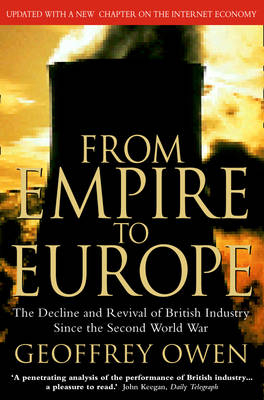
From Empire to Europe
The Decline and Revival of British Industry Since the Second World War
Seiten
2000
Harpercollins (Verlag)
978-0-00-638750-3 (ISBN)
Harpercollins (Verlag)
978-0-00-638750-3 (ISBN)
Renowned industrial expert Geoffrey Owen analyses the complex reasons behind the delayed modernisation of British industry.
In 1945, following the economic hardship of the war years, British industry looked forward with confidence to re-establishing links with its traditional trading partners in the Empire, and in the years of reconstruction which followed enjoyed unprecendented growth and prosperity. But the emergence of an economically vigorous and fiercely competitive Europe forced Britain to come to terms with some fundamental industrial weaknesses and to question where her economic destiny lay as the ‘miracle economies’ of France and Germany began to overtake her own.
Through case studies of key industries from textiles to pharmaceuticals, steel to electronics, Owen offers a vivid account of Britain’s industrial progress, and argues that since the late 1970s British industry has undergone a painful but necessary transformation which has rapidly modernised the UK economy.
At the start of a new millennium, as Britain once again debates its relationship with an ever more unified Europe, Geoffrey Owen provides a timely appraisal of the often troubled path that Britain has taken from Empire to Europe.
In 1945, following the economic hardship of the war years, British industry looked forward with confidence to re-establishing links with its traditional trading partners in the Empire, and in the years of reconstruction which followed enjoyed unprecendented growth and prosperity. But the emergence of an economically vigorous and fiercely competitive Europe forced Britain to come to terms with some fundamental industrial weaknesses and to question where her economic destiny lay as the ‘miracle economies’ of France and Germany began to overtake her own.
Through case studies of key industries from textiles to pharmaceuticals, steel to electronics, Owen offers a vivid account of Britain’s industrial progress, and argues that since the late 1970s British industry has undergone a painful but necessary transformation which has rapidly modernised the UK economy.
At the start of a new millennium, as Britain once again debates its relationship with an ever more unified Europe, Geoffrey Owen provides a timely appraisal of the often troubled path that Britain has taken from Empire to Europe.
Geoffrey Owen was born in 1934 and educated at Rugby and Balliol college, Oxford. He joined the Financial Times immediately after his national service, initially as a feature writer, then as US correspondent and Industry Editor. He joined the government’s Industrial Organization Corporation as an executive and spent three years at British Leyland before returning to the FT as Deputy Editor in 1974, becoming Editor in 1981. Having been knighted in 1988, he left the FT in 1990 and is currently Director of Business Policy at the London School of Economics.
| Erscheint lt. Verlag | 20.11.2000 |
|---|---|
| Zusatzinfo | Index |
| Verlagsort | London |
| Sprache | englisch |
| Maße | 129 x 198 mm |
| Gewicht | 381 g |
| Themenwelt | Geisteswissenschaften ► Geschichte ► Regional- / Ländergeschichte |
| Geschichte ► Teilgebiete der Geschichte ► Wirtschaftsgeschichte | |
| Technik | |
| Wirtschaft ► Volkswirtschaftslehre ► Makroökonomie | |
| Wirtschaft ► Volkswirtschaftslehre ► Mikroökonomie | |
| ISBN-10 | 0-00-638750-0 / 0006387500 |
| ISBN-13 | 978-0-00-638750-3 / 9780006387503 |
| Zustand | Neuware |
| Haben Sie eine Frage zum Produkt? |
Mehr entdecken
aus dem Bereich
aus dem Bereich
die Ukraine, Polen und der Irrweg in der russischen Geschichte
Buch | Hardcover (2023)
C.H.Beck (Verlag)
28,00 €


